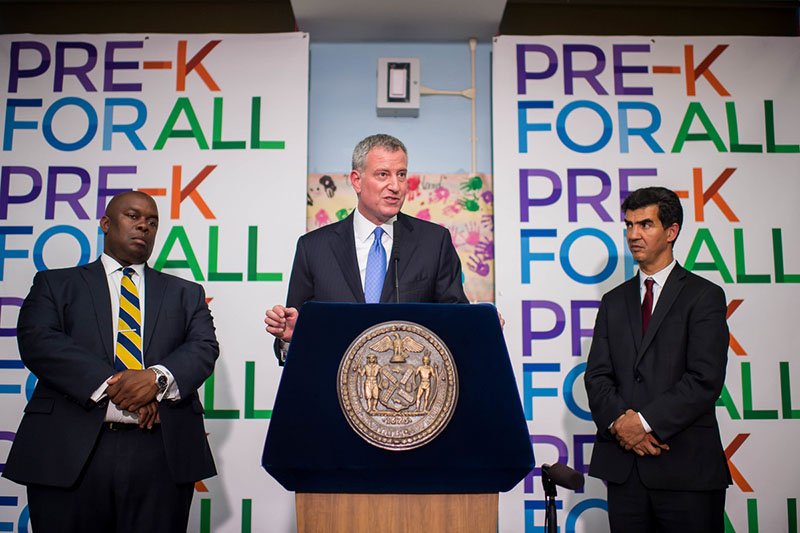All Work
Early Childhood Education
What Pre-K Evangelists Get Wrong
Despite the widely-repeated claims, pre-K doesn’t give disadvantaged children a strong start, and it doesn’t provide useful child care for large numbers of working parents.
Child Care, Not Pre-K, is Our Nation’s Most Important Early Education Program
While early childhood has rapidly been moving into the national spotlight, much of early childhood research remains weak and ill-focused. A $35.5 million grant given to Harvard last month could make a big impact in moving high quality research forward.
A Much-Needed Pre-K Primer
Failing to differentiate among early childhood programs results in misleading polls about support for pre-K.
We’re Asking the Wrong Questions About Early Childhood Education
Does pre-K work? We don’t know — and it’s the wrong question to be asking. The critical question is: what are the most effective early interventions for improving disadvantaged children’s lives?
Does Pre-K Work? The Research on Ten Early Childhood Programs—and What it Tells Us
Widely cited early childhood programs vary greatly in both design and results. The research on these programs shows neither that “pre-K works” not that it doesn’t; rather, it shows that some early childhood programs yield particular outcomes, sometimes, for some children.
The Narrow Focus of Pre-K Research
A couple of weeks ago, RAND released a report on public pre-K, announcing that high-quality pre-K "works." But the research showing pre-K's impacts is weaker than commonly understood, and the impacts shown are much less important than reported.
Let’s Get Inside the Black Box of Pre-K
We know that pre-K can work, but not enough about what makes it work and how.
Does Pre-K Work? A Look at the Research
Is the current research base sufficient to guide new and expanding early childhood initiatives? Katharine Stevens hosts a panel of four prominent scholars to discuss the state of early childhood research. While some argue that current knowledge provides adequate support for growing pre-K programs, others suggest that stronger evidence is needed.
There’s Nothing Magical About Pre-K
Treating pre-kindergarten like a silver bullet isn’t helping the disadvantaged kids who need it most.
Renewing Childhood’s Promise: The History and Future of Federal Early Care and Education Policy
Today’s federal early care and education policies are fragmented, inefficient, and unnecessarily complex. Federal policymaking is driven by coping with what exists rather than by what we are trying to accomplish: giving America’s least-advantaged children a fair chance at a happy, productive life.
Preschool for All is No Panacea, California
Instead of launching a costly and unproven program for 4-year-olds, California should invest in helping vulnerable, young children in the home and in child care.
Pre-K Isn’t Enough
While a year of pre-K can be helpful for many children, too often focus gets diverted from improving early learning for disadvantaged young children to promoting universal pre-K for all four-year-olds.
‘Path Dependency’ in Early Childhood Policy: What It Is and Why It Matters
Our current debates over early education are confined to well-worn, counterproductive ruts in the early childhood policy road.
Too Little, Too Late
Minnesota’s fascinating preschool battle drags on, highlighting crucial questions for the expansion of early education across the country.
The Next Front in the Preschool Fight
Minnesota’s unusual debate highlights three crucial questions that the growing early care and education sector is increasingly going to face as more initiatives get off the ground across the country.
Early-Education Teachers Need Better Training
Early education is starting with a clean and unencumbered slate. This is the right time to make crucial decisions about how teachers should be prepared to educate very young children.
The Myth of Universal Pre-K
Big scale-ups of “pre-K for all” are much more useful to politicians and the middle class than to the disadvantaged children most in need of help.
What Early Education Can Learn from the K-12 Choice Movement
Early education advocates would be wise to remember the fundamental value of school choice and what it means for the long-term viability of the early education sector.
A Caution to Early Educators
It’s important to remember that getting money in the budget isn’t enough to realize the promise of early education. How early learning programs are designed and carried out is as important as whether they’re done at all.
Bigger Isn’t Better for New York City Pre-K
While adding tens of thousands of pre-K slots in a matter of months makes for good headlines, it does not make for good pre-K.





















